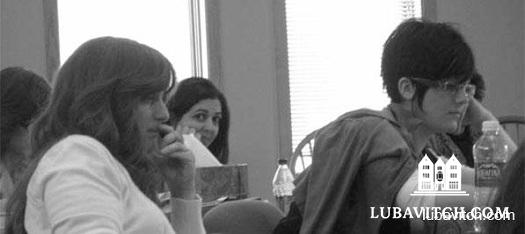Single mothers captured the spotlight in early March of this year when politicians and pundits weighed in on the subject of unwed Hollywood moms and moms-to-be. Aided by an adoring media, celebrity women project an aura of glamour around having babies without husbands.
The reality is a lot harsher, as one-time presidential hopeful Mike Huckabee commented in an interview that set off the media blitz.
Amy King, a Chicago-based accountant and divorced mother of a three-year-old son, knows firsthand how far from glamorous the life of a single mother can be. After fleeing an abuse-filled marriage that lasted four years, she’s now locked in a custody battle with her former husband – terrified of his influence over her child and struggling to pay her bills.
Urged by a Chabad rabbi, King, 35, was one of 20 women who attended a Retreat for Single Jewish Mothers pioneered by Bais Chana Women International. The February 2011 retreat was the latest addition to Bais Chana’s growing roster of learning programs for women.
The five-day retreat featured sessions on Chasidic thought and life, parenting, financial planning, and fitness, art and health (including a workshop on Laughter Yoga). Financial assistance plus childcare for children up to age five made the retreat possible for most of the participants.
Woman ranging in age from 21 to 57 came to the program from very different social circles, degrees of Jewish involvement and income brackets. Hinda Leah Sharfstein, Bais Chana’s executive director, says that some could barely afford basic necessities; others were professional women like King whose salaries disappeared into legal fees; more than one was dealing with an out-of-control or addicted teen.
One 22-year old named Rachel reflected that she’d been married too young and to the wrong man, and now was looking for a way to refocus her life.
Differences aside, the women bonded over similar concerns. They all wanted to be good parents; they felt isolated, and were burdened by being sole provider and decision-maker. They overwhelmingly felt that life wasn’t the way it was supposed to be.
Sharfstein pondered the irony in the fact that on the day the retreat’s groundbreaking session started in February, a new poll from the Pew Research Center showed that tolerance was high nationally for every kind of non-traditional family, with one exception: single mothers.
Now that census statistics show that traditional nuclear families make up barely one in five households in the United States, the Jewish community cannot help but be affected.
“Clearly, Bais Chana has pioneered something necessary and extraordinary,” Sharfstein said.
Teachers and Mentors
King, the daughter of Russian-Jewish immigrants, had worked hard to establish a career and had looked forward to having a family. For some time she hid the abuse in her marriage, and now she is embarrassed to be in the situation she’s in.
“I should have known better,” she says.
Self-blame and shattered identities were common to most of the women at the retreat. Jewish-Chasidic insights broadened their perspective in unexpected ways.
Karen Stein, 50, a former teacher from Los Angeles, said a vague guilt seemed to underlie her feelings about herself. “We just assume that we did something to cause it or deserve [their lot].”
Rabbi Manis Friedman, Bais Chana’s lead educator and co-founder, turns perspectives like these upside down. “G-d owes you an apology,” he told Stein.
Her story, decades after the experience, still raises vivid memories of desperate fear, physical intimidation, and emotional manipulation. “Rabbi Friedman opened my eyes to the possibility of being able to expect something good in my life, something I was blocking,” she said. “It was very freeing.”
The retreat’s resident psychotherapist, Nachshon Zohari, saw similar breakthroughs at the retreat.
“[They] walked in the door feeling isolated and not in control of their lives, and they’re leaving in the driver’s seat with a new family of people who really understand them,” he said in an interview. Zohari’s focus on finding one’s innate strength, or personal genius, as he calls it, is grounded in a blend of Chasidic thought and developmental psychology.
Bais Chana’s nonjudgmental atmosphere, its women teachers who serve as role models of strength, and Hinda Leah Sharfstein’s unerring instinct for putting her finger on the pulse of Jewish women undoubtedly contributed to the program’s impact.
Next Steps
Bais Chana Women’s International plans to hold two Single Jewish Mothers Retreats yearly. The February retreat in St. Paul, Minn., was hosted by Bais Chana co-founders Rabbi Moshe and Mindy Feller. The next session is planned for November 2011, provided that funding is in place. Sharfstein meanwhile is setting up a private social network and forum that will allow participants to stay in touch with each other and the Bais Chana mentors. A public section of the forum, she hopes, will become a resource for the larger Jewish social service community and other single Jewish mothers.
Bais Chana Women International ranked second by GuideStar and GreatNonprofits among the top ten nonprofits empowering women nationally. For more information contact info@baischana.org.

Be the first to write a comment.